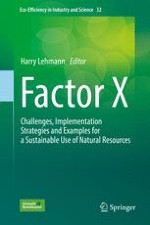2018 | OriginalPaper | Buchkapitel
9. Developing Resource Competence – Anchoring Resource Conservation and Efficiency in the German Education System
verfasst von : Carolin Baedeker, Holger Rohn, Michael Scharp, Jaya Bowry
Erschienen in: Factor X
Aktivieren Sie unsere intelligente Suche, um passende Fachinhalte oder Patente zu finden.
Wählen Sie Textabschnitte aus um mit Künstlicher Intelligenz passenden Patente zu finden. powered by
Markieren Sie Textabschnitte, um KI-gestützt weitere passende Inhalte zu finden. powered by
